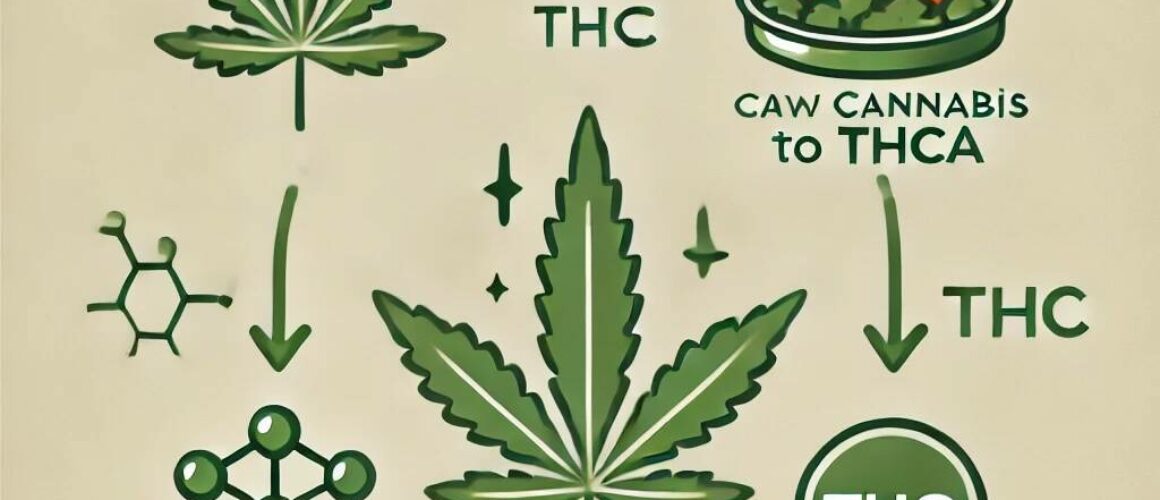Exploring THCA: What It Is and How It Differs from THC
As interest in cannabis continues to grow, more people are learning about the various compounds within the plant and how they impact health and wellness. THCA (tetrahydrocannabinolic acid) is one of the primary cannabinoids found in raw cannabis, and while it may sound similar to THC (tetrahydrocannabinol), it has distinct properties and effects. This article explores what THCA is, its potential benefits, how it transforms into THC, and how it can be used for non-psychoactive benefits.
What is THCA?
THCA is the acidic precursor to THC and is found abundantly in raw cannabis. Unlike THC, THCA is non-psychoactive, meaning it doesn’t produce the “high” associated with traditional cannabis use. In fresh cannabis plants, cannabinoids are found in their acidic forms, which means THCA is present in much higher concentrations than THC before the plant is processed or heated.
THCA is converted into THC through a process called decarboxylation. This occurs when raw cannabis is exposed to heat, whether through smoking, vaping, or cooking. During decarboxylation, the heat causes the THCA molecule to lose a carboxyl group, transforming it into THC, which is psychoactive.
Properties and Potential Benefits of THCA
- Anti-Inflammatory Properties: THCA is believed to have anti-inflammatory effects, making it potentially beneficial for conditions like arthritis and other inflammatory disorders. Its ability to interact with receptors in the body’s endocannabinoid system may help reduce inflammation without psychoactive effects. VA.gov | Veterans Affairs
- Neuroprotective Effects: Some research suggests that THCA may have neuroprotective properties, which could be beneficial for neurodegenerative diseases such as Alzheimer’s and Parkinson’s disease. VA.gov | Veterans Affairs
- Anti-Emetic Properties: THCA may help alleviate nausea and vomiting, making it potentially useful for individuals undergoing treatments like chemotherapy. VA.gov | Veterans Affairs
- Pain Relief: Like other cannabinoids, THCA may have analgesic properties. It is often used by individuals looking for pain relief without the psychoactive effects of THC.
How THCA Changes to THC
As mentioned, THCA converts to THC through decarboxylation, a process triggered by heat. When raw cannabis is heated during smoking, vaping, or cooking, the THCA is transformed into THC, allowing it to produce psychoactive effects. The higher the temperature and the longer the exposure, the more THCA is converted to THC.
Decarboxylation is essential for those who want the psychoactive effects of cannabis. However, for users interested in THCA’s non-psychoactive benefits, consuming raw cannabis or products specifically formulated to retain THCA is ideal.
The Benefits of Raw Cannabis and Non-Psychoactive Uses of THCA
Raw cannabis consumption is becoming increasingly popular among health-conscious individuals seeking the benefits of cannabinoids without psychoactivity. By consuming raw cannabis, users can access THCA along with other acidic cannabinoids, terpenes, and beneficial compounds.
- Raw Cannabis Juicing: Blending fresh cannabis leaves and buds into a juice or smoothie is one of the most common ways to consume THCA.
- Cold-Pressed Cannabis Oils: Some manufacturers offer cold-pressed cannabis oils specifically formulated to retain THCA.
- THCA Tinctures and Capsules: Convenient ways to incorporate THCA into your wellness routine.
Conclusion
THCA is an intriguing compound with a range of potential health benefits, particularly for those interested in cannabis’s therapeutic properties without its psychoactive effects. Whether you are looking for natural pain relief, anti-inflammatory support, or neuroprotective benefits, THCA offers a promising option.

